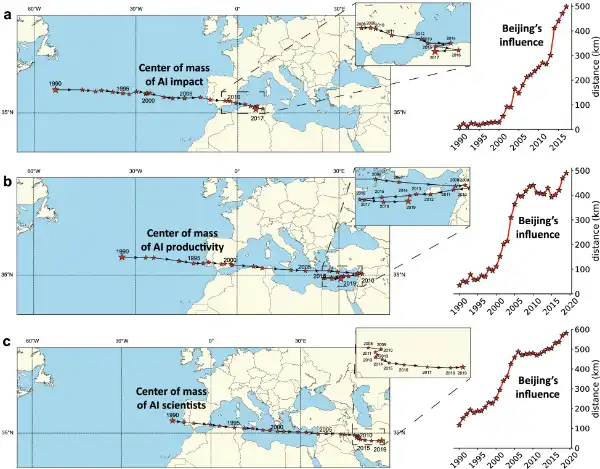Project Summary
Artificial Intelligence (AI) has become a crucial driver of global competitiveness, with China emerging as a strong contender to challenge the US’s position as the leading AI power. Using a dataset consisting of 5 million and 350,000 AI papers and scientists, respectively, we analyze the interdependence between Eastern and Western cities in terms of citations, collaborations, and talent migrations.
We show that Beijing has been the most impactful city since 2007, the most productive since 2002, and housing the largest number of AI scientists since 1995, making it the central gateway for AI knowledge and talent flow between East and West. We also reveal that East-East collaborations are more common than East-West or West-West collaborations, and most AI scientists migrate from one Eastern city to another. Furthermore, the study finds that cross-border collaborations between China and the US have been increasing since the millennium, and scientists who migrate to one country continue to collaborate frequently with the origin country. Finally, we reveal that the two nations have always been more impactful when collaborating together, suggesting that instead of discouraging cross-border migration and collaboration, promoting such activities would benefit the field of AI.
Publications
1. Bedoor AlShebli, Shahan Ali Memon, James Evans, Talal Rahwan: “China and the US produce more impactful AI research when collaborating together”. Scientific Reports (2025)
2. Bedoor AlShebli, Enshu Cheng, Marcin Waniek, Ramesh Jagannathan, Pablo Hernández-Lagos, Talal Rahwan. “Beijing’s central role in global artificial intelligence research“. Scientific Reports (2022).
Works in Progress
1. Nouar AlDahoul, Maria Sahakyan, Marcin Waniek, Bedoor AlShebli, Yasir Zaki, Talal Rahwan. “Detecting Heterogeneity in Observational Data using Explainable Artificial Intelligence
Talks
1. “The interdependence and knowledge flow between the East and West in Global AI Research” at WTFNS Workshop 2023, NYU, New York.
2. “A Global Perspective of Scientific Publications” at Department of Informatics and Network Systems, University of Pittsburgh.
3. “Explainable Artificial Intelligence as a Generic Data Analysis Tool” at IC2S2 2023, Copenhagen, IL
